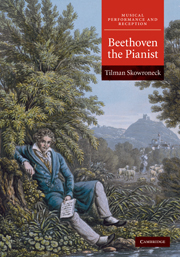Summary
This study investigates Beethoven's formative years as a keyboardist and his active career as a keyboard performer, the most important part of which stretches from his youth to the first years of the nineteenth century. Two elements are generally seen as responsible for the end of this career, namely the loss of his hearing and his changing ambitions as a composer. A convenient limit is the turn of the year 1808: Beethoven's last important public appearance as a pianist was on December 22, 1808, and on February 7, 1809, Johann Friedrich Reichardt heard and praised the result of years of hard work by the Streicher piano-building firm: a “perfect” piano that possessed greater sonority and diversity than the earlier Viennese pianos.
If we address Beethoven's keyboard playing and the practice of performing his piano works, one important question is in what way the keyboard tutors of the late eighteenth century fit into the picture. Opinions on this matter vary considerably. The relationship between an eighteenth-century tutor and eighteenth-century performance practice would in any case require careful study. The information we have about Beethoven's relationship to both is even less clear and often contradictory. Apparently even Beethoven's personal opinions about the theorists of his time varied according to the circumstances.
This book is about change: it addresses the changing performance conventions during Beethoven's lifetime, his changing compositional style, his changing keyboard playing, and changes in piano building.
- Type
- Chapter
- Information
- Beethoven the Pianist , pp. 1 - 8Publisher: Cambridge University PressPrint publication year: 2010



